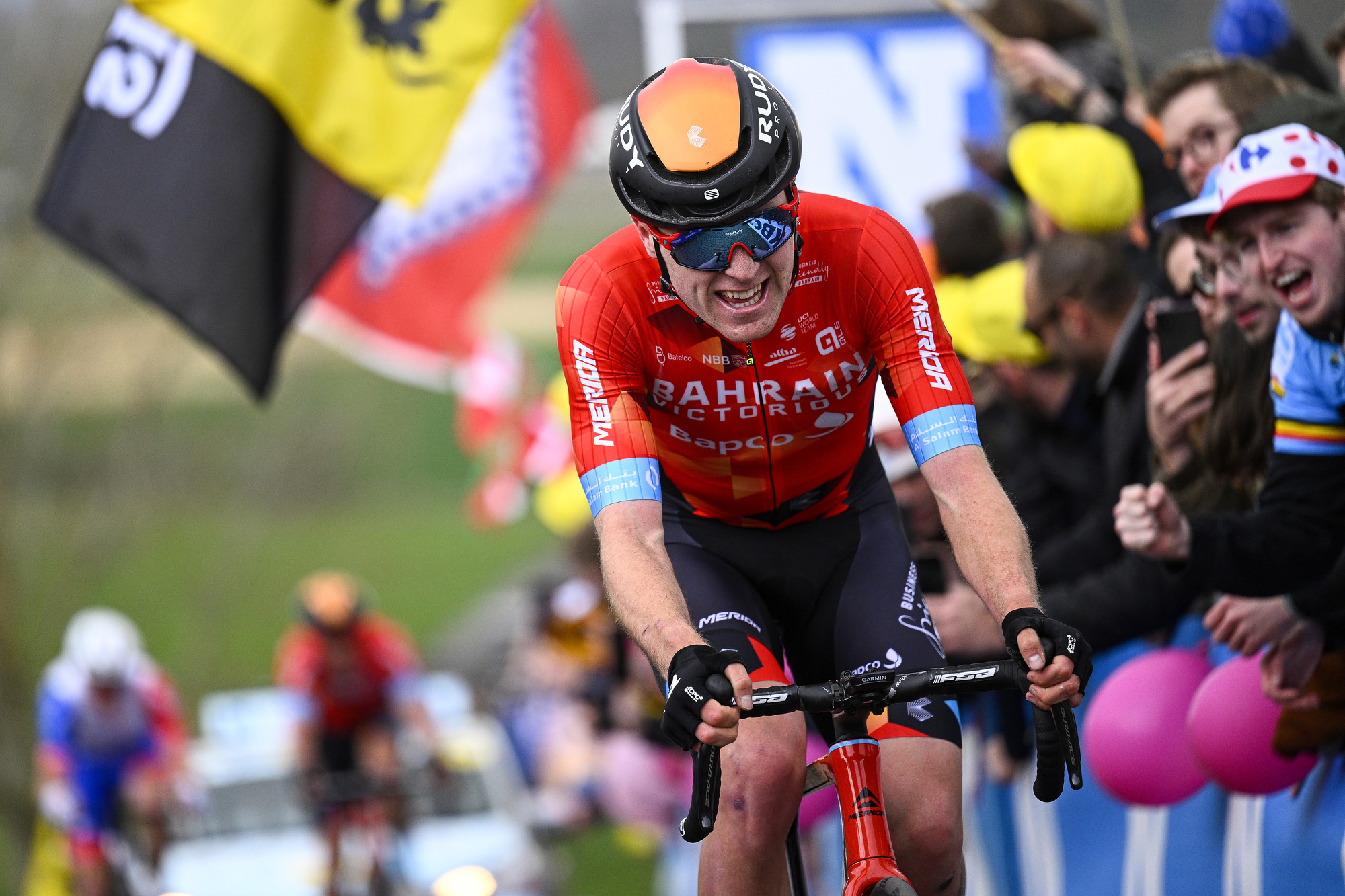Fred Wright: Tour of Flanders was the hardest race I’ve ever done
Briton takes 7th after anticipating Van der Poel and Pogacar in finale

Fred Wright sat draped over his top tube, 272km in his legs, 7th place in his hands, and more thoughts in his head than he knew how to process in that precise moment. The Tour of Flanders tends to have that kind of an effect.
“I can’t really speak, I’m so tired,” Wright said apologetically to the journalists leaning across the barriers of the mixed zone. “I think I need some food or something.”
The Briton’s exhaustion was understandable, though he did his best to put it into words all the same. Wright had lined up at this Tour of Flanders in support of Matej Mohorič and Dylan Teuns, but Bahrain Victorious were eager to anticipate the inevitable accelerations from Tadej Pogačar (UAE Team Emirates) and eventual winner Mathieu van der Poel (Alpecin-Fenix) in the finale.
Wright, therefore, was delegated to track a move by Dylan van Baarle (Ineos Grenadiers) over the first ascent of the Paterberg, and this duo led the race up the fearsome Koppenberg. They would be joined by Pogačar, Van der Poel and Valentin Madouas (Groupama-FDJ) on the Taaienberg with 36km remaining, and Wright quickly realised he was aboard the winning move at the Ronde.
“It’s just an elimination race, you know, so I was happy to be with Dylan van Baarle on the first time up the Paterberg, because I knew being ahead for the Koppenberg and Taaienberrg was going to help me,” Wright said. “Obviously Mathieu and Tadej are better than me on the climbs. So to be in the front group of five when they came across, I was super, super happy.”
At 22 years of age, Wright was the youngest and least experienced man in the break, and his efforts were beginning to tell by the time they tackled the Kruisberg-Hotond, of top of which there was little chance to recover ahead of the final round over the Oude Kwaremont and Paterberg. When Pogačar accelerated viciously on the former, only Van der Poel could follow, while Wright found himself pushing against the limits of what was possible on a day like this.
“I was just on my knees you know. I really was trying to do as little as possible, and I think they all knew I was knackered,” Wright admitted. “I thought I’d come around a little bit, but as soon as Tadej started riding on the Kwaremont, I had to ride at my own pace. In the end it just becomes a time trial. That was the hardest race I’ve ever done, and it was special being on the Kwaremont.”
Get The Leadout Newsletter
The latest race content, interviews, features, reviews and expert buying guides, direct to your inbox!
Van der Poel and Pogačar remained in sight on the seemingly infinite run-in to Oudenaarde, but Wright was by then more concerned with fending off the men who were closing in from behind, His teammate Dylan Teuns managed to bridge across with Stefan Küng (Groupama-FDJ), and Wright encouraged the Belgian to strike out in the final kilometres.
“Not gonna lie: not one bit,” Wright smiled when asked if he believed he could catch the leaders. “I was like, ‘Dylan, you’ve got to go,’ because I was just ticking down the ks. I swear, that’s the longest 10k in all of cycling, especially with the headwind…”
Teuns would close to within two seconds of Van der Poel by the finish, coming home in 6th place, while Wright crossed the line a further 9 seconds back in 7th. “I hoped Dylan would be able to do something because he had better legs than me, but everyone is on their knees at that point,” said Wright, who will line out at Amstel Gold Race and Paris-Roubaix over the next two weekends.
“I was just trying my best to follow. I could feel what my limits were and I gave it my best. To be in the top ten, I’m fucking happy with that, man. It’s good, it’s incredible.”

Barry Ryan was Head of Features at Cyclingnews. He has covered professional cycling since 2010, reporting from the Tour de France, Giro d’Italia and events from Argentina to Japan. His writing has appeared in The Independent, Procycling and Cycling Plus. He is the author of The Ascent: Sean Kelly, Stephen Roche and the Rise of Irish Cycling’s Golden Generation, published by Gill Books.